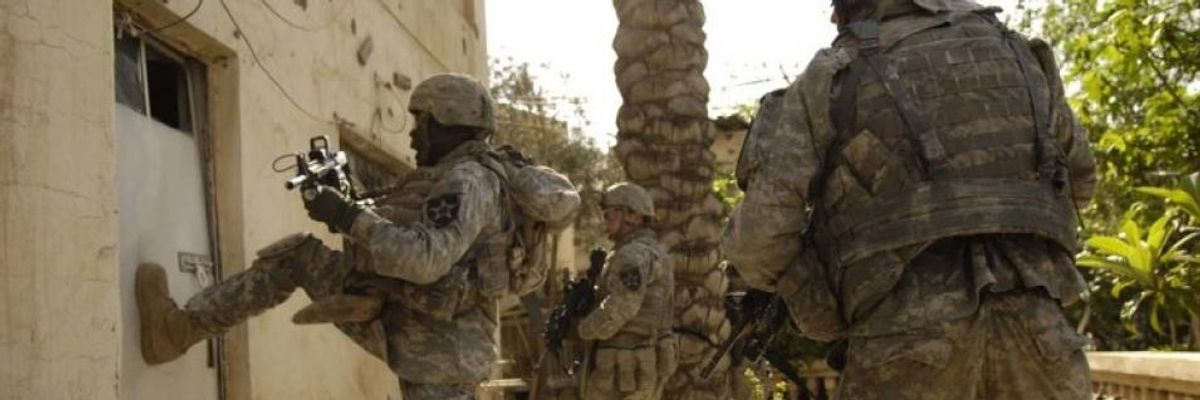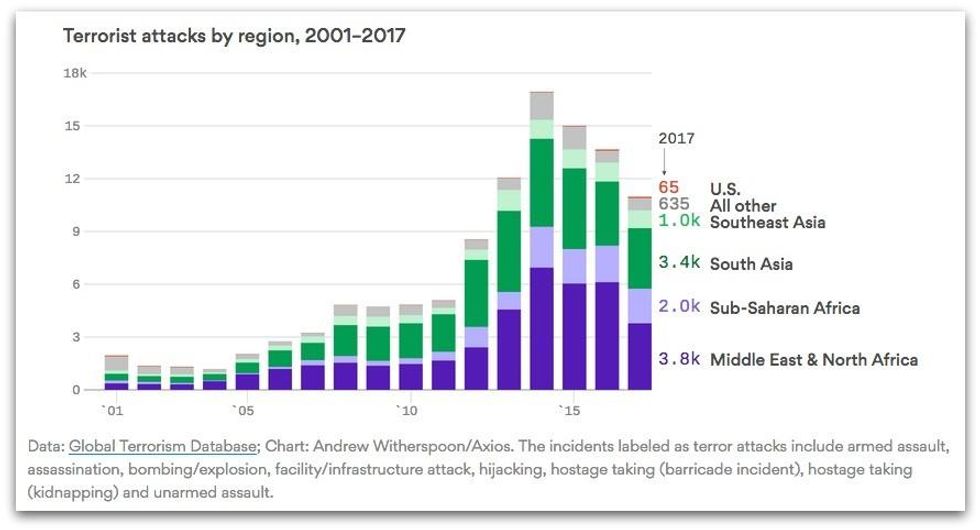

SUBSCRIBE TO OUR FREE NEWSLETTER
Daily news & progressive opinion—funded by the people, not the corporations—delivered straight to your inbox.
5
#000000
#FFFFFF
To donate by check, phone, or other method, see our More Ways to Give page.


Daily news & progressive opinion—funded by the people, not the corporations—delivered straight to your inbox.

A U.S. Army Soldier from the 1st Stryker Brigade Combat Team kicks in the door of a building during a cordon and search in Buhriz, Iraq, March 14, 2007. (Photo: Flickr / U.S. Air Force photo / Staff Sgt. Stacy L. Pearsall)
In the 17 years since the events of Sept. 11 2001, after which the United States declared a "global war on terror," there has not been a terrorist attack of similar size or magnitude on American soil.
However, according to findings in a new congressionally mandated report by the United States Institute of Peace--authored by members of a federal task force focused on extremism--nations around the world have suffered a five-fold increase in terrorist attacks following the post-9/11 policies unleashed by the U.S. and its allies.
The focus of the report--titled Beyond the Homeland: Protecting America from Extremism in Fragile States--maintains a very U.S.-centric worldview. And while it does little or nothing to critically challenge the widely criticized policies pursued by the Bush, Obama, or Trump presidencies, its tabulation of the dramatic rise in destablized states and growing terrorist violence throughout the regions where the U.S. military has been most active since 2001--namely, the Middle East and North Africa, South Asia, and Sub-Saharan Africa--is nonetheless revealing.

That the so-called "global war on terror" is, in fact, creating more terrorists than it eliminates is not news. Even the CIA has admitted that.
But 17 years after that fateful and horrifying day--and with the people of Syria, Iraq, Afghanistan, Libya, Somalia, Pakistan, Ethiopia, Chad, Yemen, and many other countries still being forced to suffer the consequences of a nearly borderless, limitless war--it remains important to once more document the futility of violence as being a solution to... violence.
Trump and Musk are on an unconstitutional rampage, aiming for virtually every corner of the federal government. These two right-wing billionaires are targeting nurses, scientists, teachers, daycare providers, judges, veterans, air traffic controllers, and nuclear safety inspectors. No one is safe. The food stamps program, Social Security, Medicare, and Medicaid are next. It’s an unprecedented disaster and a five-alarm fire, but there will be a reckoning. The people did not vote for this. The American people do not want this dystopian hellscape that hides behind claims of “efficiency.” Still, in reality, it is all a giveaway to corporate interests and the libertarian dreams of far-right oligarchs like Musk. Common Dreams is playing a vital role by reporting day and night on this orgy of corruption and greed, as well as what everyday people can do to organize and fight back. As a people-powered nonprofit news outlet, we cover issues the corporate media never will, but we can only continue with our readers’ support. |
In the 17 years since the events of Sept. 11 2001, after which the United States declared a "global war on terror," there has not been a terrorist attack of similar size or magnitude on American soil.
However, according to findings in a new congressionally mandated report by the United States Institute of Peace--authored by members of a federal task force focused on extremism--nations around the world have suffered a five-fold increase in terrorist attacks following the post-9/11 policies unleashed by the U.S. and its allies.
The focus of the report--titled Beyond the Homeland: Protecting America from Extremism in Fragile States--maintains a very U.S.-centric worldview. And while it does little or nothing to critically challenge the widely criticized policies pursued by the Bush, Obama, or Trump presidencies, its tabulation of the dramatic rise in destablized states and growing terrorist violence throughout the regions where the U.S. military has been most active since 2001--namely, the Middle East and North Africa, South Asia, and Sub-Saharan Africa--is nonetheless revealing.

That the so-called "global war on terror" is, in fact, creating more terrorists than it eliminates is not news. Even the CIA has admitted that.
But 17 years after that fateful and horrifying day--and with the people of Syria, Iraq, Afghanistan, Libya, Somalia, Pakistan, Ethiopia, Chad, Yemen, and many other countries still being forced to suffer the consequences of a nearly borderless, limitless war--it remains important to once more document the futility of violence as being a solution to... violence.
In the 17 years since the events of Sept. 11 2001, after which the United States declared a "global war on terror," there has not been a terrorist attack of similar size or magnitude on American soil.
However, according to findings in a new congressionally mandated report by the United States Institute of Peace--authored by members of a federal task force focused on extremism--nations around the world have suffered a five-fold increase in terrorist attacks following the post-9/11 policies unleashed by the U.S. and its allies.
The focus of the report--titled Beyond the Homeland: Protecting America from Extremism in Fragile States--maintains a very U.S.-centric worldview. And while it does little or nothing to critically challenge the widely criticized policies pursued by the Bush, Obama, or Trump presidencies, its tabulation of the dramatic rise in destablized states and growing terrorist violence throughout the regions where the U.S. military has been most active since 2001--namely, the Middle East and North Africa, South Asia, and Sub-Saharan Africa--is nonetheless revealing.

That the so-called "global war on terror" is, in fact, creating more terrorists than it eliminates is not news. Even the CIA has admitted that.
But 17 years after that fateful and horrifying day--and with the people of Syria, Iraq, Afghanistan, Libya, Somalia, Pakistan, Ethiopia, Chad, Yemen, and many other countries still being forced to suffer the consequences of a nearly borderless, limitless war--it remains important to once more document the futility of violence as being a solution to... violence.